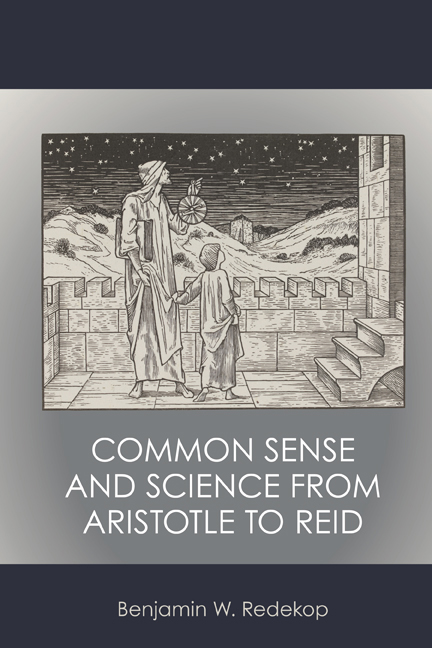Book contents
- Frontmatter
- Contents
- Acknowledgments
- Introduction
- 1 Common Sense and Scientific Thinking before Copernicus
- 2 The Challenge of Modern Science and Philosophy
- 3 Common Notions, Sens Commun: Herbert of Cherbury and Renè Descartes
- 4 Hobbes, Locke, and Innatist Responses to Skepticism and Materialism
- 5 Common Sense in Early Eighteenth-Century Thought
- 6 Common Sense and Moral Sense: Buffier, Hutcheson, and Butler
- 7 Common Sense and the Science of Man in Enlightenment Scotland: Turnbull and Kames
- 8 Common Sense, Science, and the Public Sphere: The Philosophy of Thomas Reid
- Epilogue
- Notes
- Index
8 - Common Sense, Science, and the Public Sphere: The Philosophy of Thomas Reid
Published online by Cambridge University Press: 07 November 2020
- Frontmatter
- Contents
- Acknowledgments
- Introduction
- 1 Common Sense and Scientific Thinking before Copernicus
- 2 The Challenge of Modern Science and Philosophy
- 3 Common Notions, Sens Commun: Herbert of Cherbury and Renè Descartes
- 4 Hobbes, Locke, and Innatist Responses to Skepticism and Materialism
- 5 Common Sense in Early Eighteenth-Century Thought
- 6 Common Sense and Moral Sense: Buffier, Hutcheson, and Butler
- 7 Common Sense and the Science of Man in Enlightenment Scotland: Turnbull and Kames
- 8 Common Sense, Science, and the Public Sphere: The Philosophy of Thomas Reid
- Epilogue
- Notes
- Index
Summary
The thought of Thomas Reid (1710–1796) presents a fitting climax and culmination of the story we have been following about the relationship between common sense and science dating back to the ancient Greeks. As we have seen, by the turn of the eighteenth century the New Science had challenged the intellectual primacy of common-sense experience in favor of recondite, expert, and even counterintuitive knowledge increasingly mediated by specialized instruments. Meanwhile modern philosophical thinking that emerged in tandem with the New Science, including skeptical and materialist currents of thought, had problematized the perceptions of everyday sense experience and accepted understandings of the self, morality, religion, and society. Everything was “up for grabs,” intellectually, and thinkers from across the intellectual spectrum and throughout Europe felt compelled to revisit the grounds of our most basic beliefs and forms of knowledge.
In the case of Reid's contemporary David Hume (1711–1776), reexamination of the fundamental bases of human knowledge led to skeptical scrutiny of, among other things, our perception of causal relations in nature, a fundamental precondition of scientific endeavor. In this chapter I argue that in responding to this “problem of induction” as advanced by Hume, Reid completed the long-term philosophical process, outlined in previous chapters, of reconnecting everyday understanding and experience with the findings and methods of modern natural science. An educator and mathematician selfconsciously working within the framework of the New Science, Reid articulated a philosophical foundation for natural knowledge anchored in the human constitution and in processes of adjudication in an emerging modern public sphere of enlightened discourse. Reid thereby completed the ongoing intellectual transformation of one of the bases of Aristotelian science—common experience—into a philosophically and socially justified notion of “common sense.” This fact, along with the fact that his perspective—and that of the common-sense/ moral sense philosophical tradition generally—was supportive of orthodox Christian theology and moral precepts, helps to explain why Reid's thought was so influential in nineteenth-century Europe and America (discussed at length in the Epilogue).
- Type
- Chapter
- Information
- Common Sense and Science from Aristotle to Reid , pp. 111 - 134Publisher: Anthem PressPrint publication year: 2020



